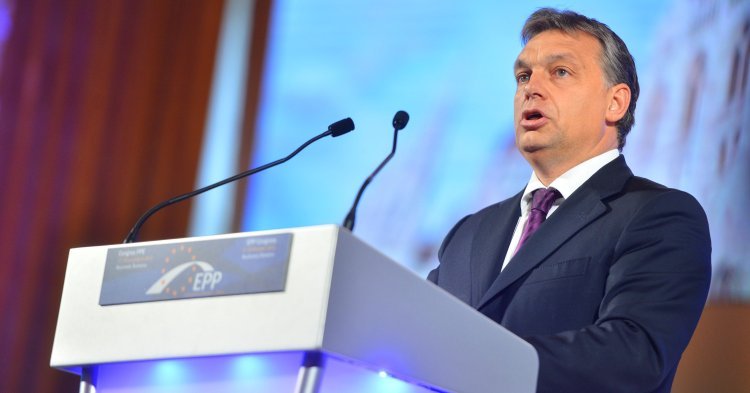Under the guise of fighting coronavirus, Orbán’s Emergency Law grants the government exceptional powers. Until the end of the ‘emergency’ (a date which is not specified), it allows the government to govern by decree at the expense of any existing law (including the Constitution), dissolves Parliament, and bans any local elections or referenda. No less importantly, it modifies the Criminal Code to further curb freedom of the press: it punishes the dissemination of ‘fake news’ (yet another term which is not defined) with up to five years in prison, and lays down a three-year prison terms for the ‘obstruction’ of ‘measures’ introduced to tackle coronavirus.
The Emergency Law comes into force in a context in which the capacity for judicial, legislative, academic or media scrutiny has been rendered almost impossible: parliament and the courts have shut as a result of coronavirus, and the press has faced years of aggressive government-led assault. Orbán, writes Kim Lane Scheppele, has ‘suspended’ Hungarian democracy, while his supporters, including pro-government lawyer Miklós Szánthó, denounce the ‘globalist’ and ‘anti-state’ opposition’s efforts to ‘create an even bigger panic’ in an attempt to overthrow the government.
Orbán’s Emergency Law not only strikes at the values which, according to Article 2 of the Treaty on European Union (TEU), the EU is founded on – freedom, democracy, the Rule of law or the rights of (political) minorities. It also highlights, once again, the limits of a Union which, overwhelmed by never-ending crises, lacks the competences to guarantee the upholding of its own Treaties.
Article 7 TEU, the instrument which allows a Member State to be sanctioned for breaches of the Union’s fundamental values, has repeatedly proved to be inefficient: its unanimity requirement has allowed an express alliance between the national-catholic Polish government and its ‘illiberal’ Hungarian counterpart to empty it of any legal force. The Commission’s efforts, on the other hand, have been met with fierce retaliation: Frans Timmermans, who led the Juncker Commission’s fight against Poland’s judiciary reform, lost the Commission presidency in 2019 – vetoed, precisely, by Poland and Hungary.
The cases of Poland and Hungary illustrate the paradox at the heart of the EU: two governments which would fail to satisfy the Copenhagen Criteria – the EU’s accession requirements – are preventing the Union from upholding its values. A combined 50 million EU citizens (10 million Hungarians and 38 million Poles) are thereby being left unprotected, as the European Parliament has repeatedly denounced.
In 1928, Joseph Goebbels, Hitler’s Propaganda minister, wrote that his party, ‘an anti-parliamentarian party that for good reasons rejects the Weimar constitution and its republican institutions’, nonetheless sought to enter the Reichstag ‘to arm [itself] with democracy’s weapons.’ ’If democracy is foolish enough to give us free railway passes and salaries’, he added, ’that is its problem’. Viktor Orbán’s Emergency Law is an intolerable affront to the European project as a whole - one which forces Ursula von der Leyen, who has thus far sought to avoid a direct clash with Warsaw or Budapest, to show her cards once and for all.
The Union’s Achilles heel has once again been exposed. As the Article 7 procedure shows, it is largely the result of the Treaties’ rigidity, itself a product of a historic skepticism towards supranationalism, most famously espoused by Charles de Gaulle. Yet said limits have to be overcome. Whatever the reticence of some Member States, the Conference on the Future of Europe has to ensure the Union adapts to an increasingly isolationist geopolitical context - even within the European Council itself.
Establishing more flexible decision-making processes, and reducing the veto capacity of individual Member States, will not weaken the Union, as has been argued. Instead, it will ensure it functions at its most effective, upholding its values and punishing the repeated fundamental rights violations of Viktor Orbán or Jarosław Kaczyński. The Rule of law, after all, must not only be protected: it must be seen to be protected.



1. On 5 May 2020 at 10:55, by Ferenc Replying to: Hungary and the Union’s Achilles’ heel
Replying to: Hungary and the Union’s Achilles’ heel
Great article and an important issue to keep an eye on!
To make an even stronger point I think it’s necessary to clarify that the Hungarian Parliament is not actually ’shut’, as evidenced by several news reports. Yes, it has very limited means of holding the government to account (to say the least), but plenary sessions are still taking place and claiming the opposite seems like grist to the mill of those who cry “fake news” at the sight of every critical article.
Thanks for your consideration and stay healthy!
Follow the comments: |
|
